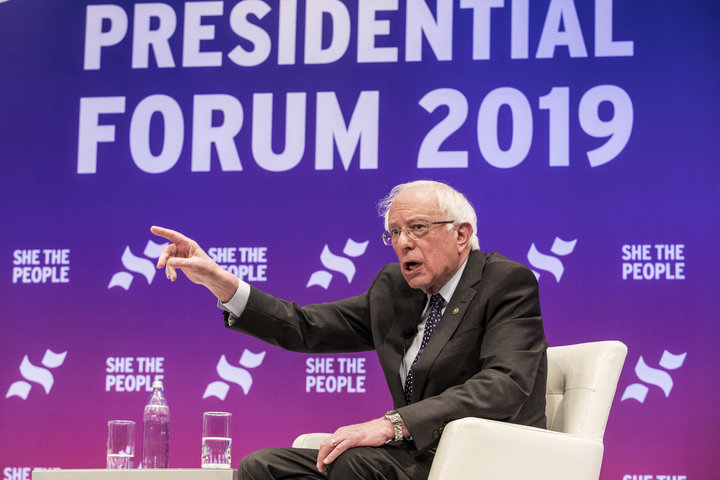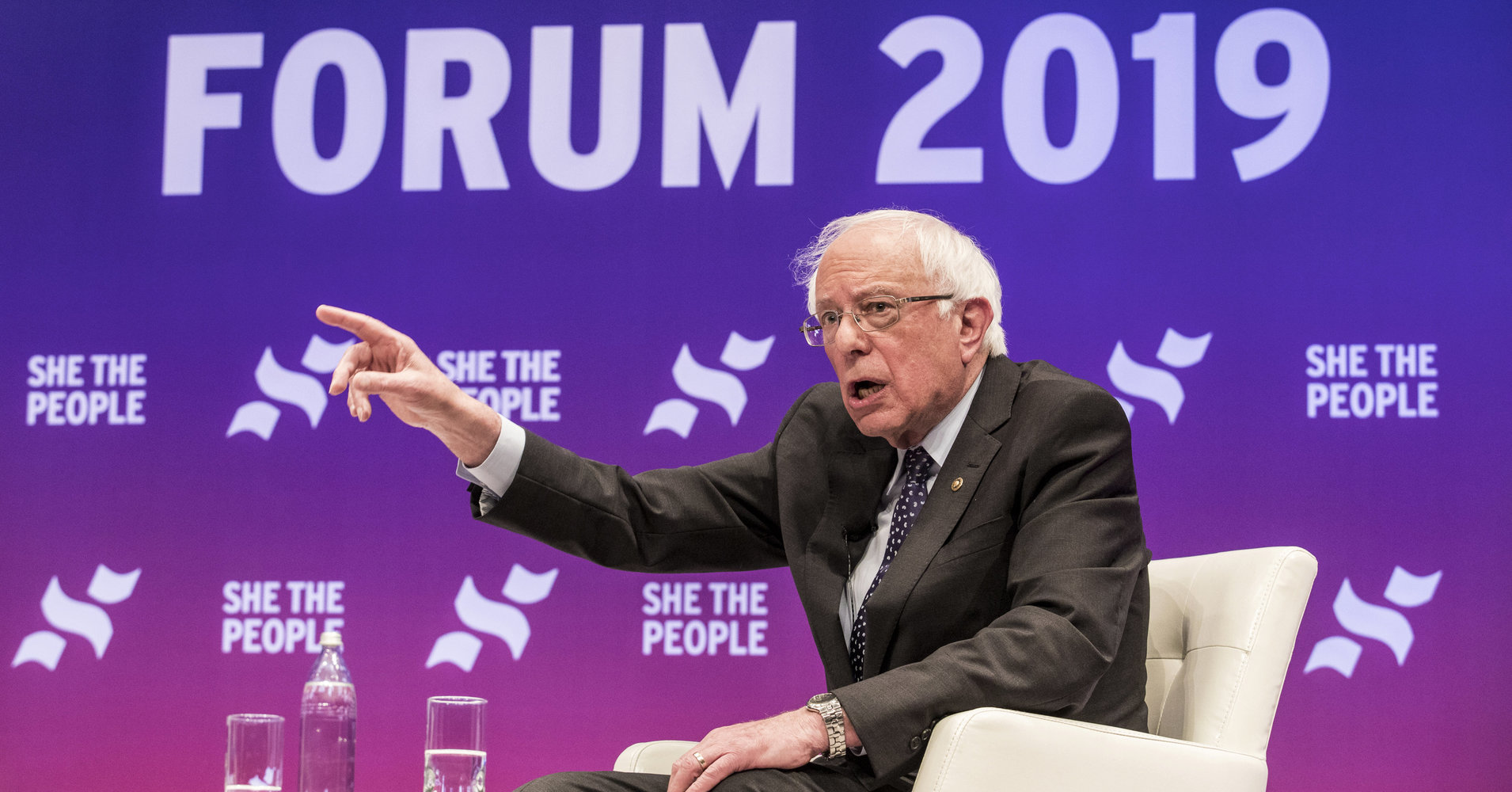[ad_1]
All of the Democrats running for president favor reforms to expand the right to vote, but the candidates are divided on one emerging question: Should people in prison, even ones convicted of the most heinous crimes, be able to vote?
The issue seemingly came out of nowhere. For months, the debate has centered on whether people should be able to vote once they leave prison. But now, activists are taking it a step further.
Sen. Elizabeth Warren (Mass.) was the first Democratic presidential candidate to go on record, albeit without saying yes or no, when HuffPost asked her about her position on the matter in March.
“While they’re incarcerated, I think that’s something we can have more conversation about,” she said.
Sen. Bernie Sanders (I-Vt.) was the first one to take a stand and endorse voting while incarcerated. The issue came up at a town hall in Muscatine, Iowa, in early April. Sanders appears to be the first candidate seeking the nomination of a major party ever to back the idea that prisoners should be allowed to vote.
The debate drew increased attention after Sanders, Sen. Kamala Harris (Calif.) and South Bend, Indiana, Mayor Pete Buttigieg were asked at CNN town halls this week whether they believed terrorists like the Boston Marathon bomber should be allowed to vote in prison. Harris expressed openness to the idea, while Buttigieg, echoing the position of many other Democrats running, said people should have their voting rights restored once they complete their criminal sentences.
Former Rep. Beto O’Rourke (Texas) and former Housing and Urban Development Secretary Julián Castro both said earlier this week that they are open to allowing nonviolent offenders to vote. O’Rourke’s current position may reflect the power of raising an issue: A spokesman had previously told HuffPost that O’Rourke only supported restoring someone’s voting rights once they were released from prison.

Maine and Vermont are the only two states that allow people to vote in prison, while Iowa, Kentucky and Virginia still permanently ban felons from voting even after they have served their time. Democrats in Hawaii and New Mexico recently tried unsuccessfully to pass legislation that would allow prisoners to vote there.
Criminal justice activists who press this issue say the national attention is long overdue, the natural extension of the increasing momentum around expanding the franchise to people with criminal histories. The direct role of the president in felon disenfranchisement is limited since the 14th Amendment gives states the authority to strip voting rights from people who commit crimes. But the candidates are elevating a debate that has gone overlooked for decades.
“The United States is very wedded to the idea of punitive justice,” said Taina Vargas-Edmond, the executive director of Initiate Justice, a criminal justice reform group. “People feel comfortable with the idea that the right to vote is something that you lose when you’re convicted of a crime. It’s something that we have been so used to that I don’t think people question or second guess.”
But that’s changing, she added. “The fact that this is part of the national dialogue and a candidate has come out and said, ‘Yes, I support this’ ― it requires other candidates now to offer reasons why they don’t support it,” Vargas-Edmond said.
The fact that this is part of the national dialogue and a candidate has come out and said, ‘Yes, I support this’ ― it requires other candidates now to offer reasons why they don’t support it.
Taina Vargas-Edmond, executive director of Initiate Justice
Twenty-three states have changed their policies dealing with felon disenfranchisement since 1997, extending the right to vote to an estimated 1.4 million people who have served their time, according to an October 2018 estimate from The Sentencing Project. In November, Florida voters approved a state constitutional amendment to automatically restore voting rights to most felons, a change that could extend voting rights to an additional 1.4 million people.
Another pivotal moment, activists say, came last year during a nationwide prison strike that got significant attention. One of the prisoners’ 10 demands was to allow people behind bars to vote.
The American Civil Liberties Union is pushing 2020 candidates to commit to allowing people to vote in prison as part of the group’s $30 million spending effort during this election cycle. Their work on the issue has already paid off: The voter who asked Sanders about it at the Iowa town hall was an ACLU activist.
The ACLU backed several successful initiatives to expand voting rights last year, but as it considered its plans for the next election, the group felt incarcerated people were being left out of the conversation around voting rights, said interim political director Ronald Newman.
“If we’re going to have this big, open, comprehensive conversation about improving the voting rights situation in the United States and then completely pretend as if this other piece wasn’t out there, you’d end up in a situation where you’d effectively perhaps have a new line, but a line that would exclude this category of folks,” Newman told HuffPost. “You would have had your big voting rights moment, and done your big expansion, and like actually forgot about this pool of people that should be on the train along with everybody else.”
Underlying the conversation about felon disenfranchisement is a larger debate about the guarantees of citizenship and whether it’s appropriate for the government to strip people of their voting rights. Many felon disenfranchisement statutes have roots in the Jim Crow South, and it’s difficult to separate the talk around felon disenfranchisement from the discussion about systemic racial inequality in the criminal justice system.
“People think that, when you’re in prison, it’s a fact of life that you don’t have the same rights as people who aren’t in prison. But we never think about what those rights are and what the effect of those rights are,” said Amani Sawari, the national coordinator of the National Right to Vote Campaign. “Policymakers haven’t taken the time to research this issue because they’re not incentivized to do so because these people cannot vote.”
Policymakers haven’t taken the time to research this issue because they’re not incentivized to do so because these people cannot vote.
Amani Sawari, national coordinator of the National Right to Vote Campaign
Although many other countries permit at least some people with felonies to vote while incarcerated, it has long been uncontroversial in the United States that individuals lose the right to vote when they get convicted of a crime. While Sanders argues that felon disenfranchisement amounts to an impermissible character test for voting, supporters of the policy say it’s reasonable to block those who break the law from having a role in making it.
“If you’re not willing to follow the laws, if you don’t have the commitment to our laws, if you don’t have that degree of responsibility and trustworthiness, then you’re not qualified to vote,” said Roger Clegg, general counsel at the Center for Equal Opportunity and a former official in the Reagan and George H.W. Bush administrations. “People who’ve been convicted of serious crimes don’t meet those serious objective qualifications. They don’t become qualified until they’ve showed that they’ve turned over a new leaf.”
The hesitancy of some candidates to call for change may reflect the lingering political sensitivity around the issue. The Republican National Committee quickly seized on the comments Sanders and Harris made earlier this week to highlight that they were open to letting convicted terrorists vote in prison.
There is “smoking gun evidence” that felon disenfranchisement laws were originally passed with racial intent, said Christopher Uggen, a sociology professor at the University of Minnesota who has studied the issue.
“These laws are not surprising given our racialized history,” he said. “What’s surprising is that they’ve persisted.”
[ad_2]
Source link

